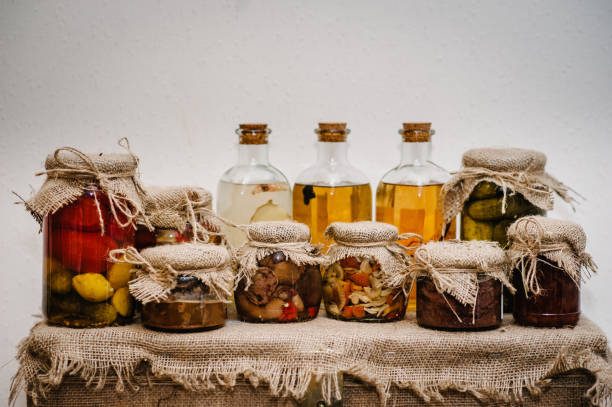Fermentation has been an integral part of Turkish cuisine for centuries, offering unique flavors and health benefits. From creamy yogurt to tangy pickles and the bold taste of şalgam, fermented foods play a vital role in daily meals and cultural traditions. In this blog, we’ll explore yogurt’s significance and regional variations, the place of pickles at traditional tables, and the history of şalgam and boza.
Yogurt: The Star of Turkish Cuisine
Yogurt is perhaps the most iconic fermented product in Turkish cuisine, with a history that stretches back to Central Asia. Known for its versatility, yogurt is consumed in various forms and has a prominent place at the Turkish table.
Culinary Role: Yogurt is used as a side dish, a sauce, or a main ingredient in many Turkish recipes. From the refreshing cacık (a yogurt and cucumber dish) to savory mantı (Turkish dumplings topped with yogurt), its applications are endless.
Ayran, a salted yogurt drink, is a favorite accompaniment to kebabs and other rich dishes, providing balance to heavier flavors.
Regional Variations: In the Black Sea region, yogurt is often served with cornmeal-based dishes like mıhlama.
Eastern Turkey’s strained yogurt, or süzme yoğurt, is thicker and often turned into a long-lasting dried product called kurut. In central Anatolia, yogurt is frequently used in soups, such as yayla çorbası, a rice and yogurt-based soup flavored with mint.
Homemade Yogurt: Many Turkish households still make yogurt at home using traditional methods. Milk is boiled, cooled, and then mixed with a starter culture from previous batches, preserving a lineage of flavor passed down through generations.
Pickles: A Tangy Tradition
Pickles, or turşu, are a cornerstone of Turkish cuisine, offering a burst of flavor and a dose of probiotics. From crunchy vegetables to unexpected combinations, pickles are a staple on Turkish tables.
Cultural Significance: Pickles are a must-have during winter, preserved to add variety and flavor to meals when fresh vegetables are less available. They are often served alongside stews, pilaf, or as a snack on their own.
Unique Pickle Varieties: Beyond cucumbers, Turkish pickles include everything from cabbage, carrots, and peppers to green plums and unripe melons. One of the most distinctive varieties is lahana turşusu (fermented cabbage), common in northern Turkey, often paired with bean dishes.
Pickle Juice: Turşu suyu, or pickle juice, is consumed as a refreshing drink, especially in southeastern Turkey. Its tangy and salty taste is believed to have detoxifying properties and is also popular as a remedy for hangovers.
Pickling Process: Traditional Turkish pickling involves saltwater brine, garlic, and vinegar, with spices varying by region. Homemade pickles are often stored in glass jars and left to ferment for weeks, achieving their signature tanginess.
Şalgam and Boza: Fermented Drinks with a Story
Turkish cuisine also boasts fermented drinks with unique flavors and rich histories. Şalgam and boza are two such beverages that continue to be cherished for their bold taste and cultural significance.
Şalgam:Şalgam is a fermented turnip juice, particularly popular in southern Turkey, especially in Adana and Mersin. Made from black carrots, turnips, and bulgur, it is known for its vibrant purple color and tangy flavor.
Typically served alongside kebabs, şalgam balances the richness of grilled meats. It can be spicy or mild, depending on the addition of chili peppers during fermentation. Şalgam has a loyal following, thanks to its refreshing properties and its reputation as a natural digestive aid.
Boza: Boza is a thick, slightly sweet fermented drink made from millet, bulgur, or maize. Its origins trace back to ancient times, with variations found across the Balkans and Central Asia. In Turkey, boza is often associated with winter, traditionally sold by street vendors. It is served with a sprinkle of cinnamon and roasted chickpeas, creating a cozy, nostalgic treat. Known for its probiotic benefits, boza is considered a hearty and energizing drink, once popular among Ottoman soldiers for its sustaining qualities.
Why Fermented Foods Matter in Turkish Cuisine
Fermented foods like yogurt, pickles, şalgam, and boza are more than just culinary staples—they are deeply rooted in Turkish culture. They embody the ingenuity of preserving seasonal ingredients and represent a connection to heritage and health. The distinct flavors they offer continue to appeal to both traditionalists and modern food enthusiasts.
Turkish cuisine’s fermented delights showcase the country’s mastery of preservation and flavor innovation. Yogurt’s versatility, pickles’ tangy charm, and the unique taste of şalgam and boza highlight the rich tapestry of Turkish food culture. Whether you’re savoring a bowl of homemade yogurt, crunching into a tangy pickle, or sipping on a glass of şalgam, these fermented treasures offer a glimpse into Turkey’s vibrant culinary traditions.

